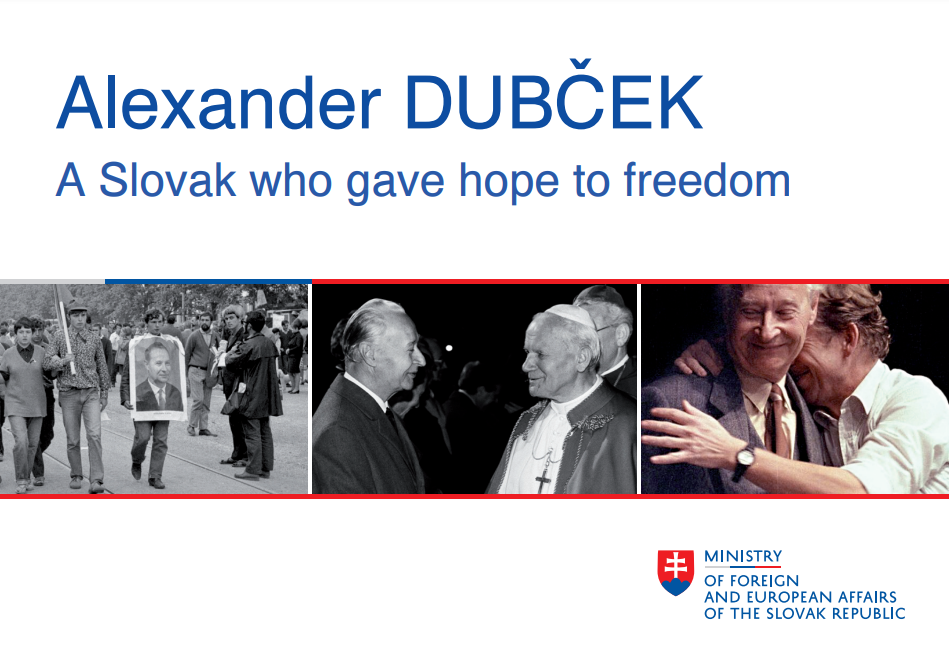Every now and then, each nation has a political figure who steps up and guides it through difficult times. It is perhaps coincidental that two important leaders in Slovak history were born in the village of Uhrovec, western Slovakia, in the same house actually: the revolutionary politician Ľudovít Štúr in 1815 and politician Alexander Dubček in 1921.
On November 7 Slovakia commemorates the passing of the latter. He was a politician whose humanity and important role during the Warsaw Pact Invasion of Czechoslovakia in 1968 are known in the democratic world, far outside Slovakia.
Alexander Dubček was born on November 27, 1921 into a family who believed in socialist ideals. He spent a part of his childhood in the Soviet Union, where his parents joined the Interhelpo group. Later he participated and fought in the Slovak National Uprising, where he was wounded twice. In that time he was already member of the then illegal Communist Party of Slovakia. From 1955-1958 he started rising through the party ranks, holding various positions and gaining experience.
In 1960s he held important offices within the Communist Party of Czechoslovakia, getting him into conflict with hard-line Stalinists.
A new generation of communists led by Alexander Dubček rose to power in Slovakia. Slowly but surely he started to strive for the political liberalization of the country. Dubček's vision was socialism as a democratic system and facilitating the political emancipation of Slovaks within the Czechoslovak Republic. The latter led to the federal arrangement of the country in late 1968, a culmination of the effort by Slovaks to gain an equal position.
Upon being appointed the CPC Central Comittee First Secretary in January 1968, he became a charismatic and popular leader. Under his slogan "Socialism with a Human Face", he steered Czechoslovakia towards democratization, economic modernization, and liberalization with the Communist Party still in power.
This era became known as the Prague Spring, an era in which the people of Czechoslovakia regained faith in politics. Dubček's efforts brought hope to Czechoslovak citizens and became known worldwide.
However, he simultaneously faced an overwhelming pressure. Soviet leadership feared that Czechoslovakia could become more independent from the Soviet Union. As a result, the country was invaded in August 1968 by the Warsaw Pact countries, ending the Prague Spring.
Dubček was forced to resign and expelled from the party. The desire of millions of Slovaks and Czechs for freedom and democracy was trampled by the invading tanks. The Soviet Army remained in order to "guard" communism for 20 years. In a period of hopelessness, Dubček became a symbol of hope.
Alexander Dubček rising to prominence again during the Velvet Revolution of 1989 was not a surprise. He returned to politics and was elected Speaker of the Federal Assembly. At the time he met with important foreign politicians who had watched his actions in 1968 from behind the Iron Curtain. During a 1990 meeting, then British prime minister Margaret Thatcher told him: "The sun then showed us your face. That was the Prague Spring of 1968 when you, Mr President, played such an important role until hope was so cruelly suppressed. The picture of this brave attempt is ineffably etched in our memories, at the same time that our inability to help you will always weigh on the conscience of the free world."
Not every story has a happy end. On September 1, 1992 Alexander Dubček's car was involved in a serious accident on the highway between Prague and Bratislava. Two months later, he succumbed to his injuries. Not only Slovaks, but the whole world lost a politician who had believed in tolerance and always stressed that we must not only see opponents, but also partners on opposing sides.
The news of Dubček's death was covered by the world media. El País wrote, "Dubček has gone from this world with the certainty that history has proven him right."
Then US president Bill Clinton said, "The death of Alexander Dubček has saddened me, but at the same time I am glad that as one of the leading personalities of the Prague Spring he lived to a time when he could see with his own eyes the spread of democracy to Eastern Europe."
For ordinary Slovaks Dubček was a symbol of hope, a leader who could admit his mistakes, one who cared for the political freedom of people and social justice. This is why they carry his memory close to their hearts even 30 years after his death.


